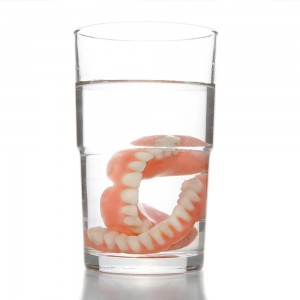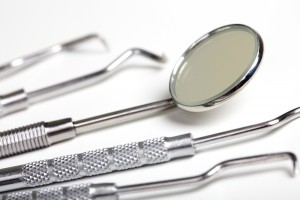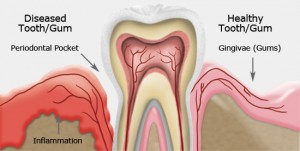
If the eyes are the windows to one’s soul and the hair is the crowning glory, the smile is considered as the best make up a person can wear. Yet, how can your beauty truly radiate when you are suffering from gum disease? This kind of disease does not only look awful, it also causes teeth discoloration and bad breath. It fact, it can even lead to a number of serious adverse effects.
What is a gum disease?
Gum disease, also referred to as periodontitis or gingivitis, starts off with the growth of bacteria in the mouth and may conclude with loss of tooth, if not properly taken care of. This is caused by the deterioration of the tissue around the teeth.
Being the mild type of gum disease, gingivitis commonly does not cause severe discomfort. However, it causes the gums to turn red, swell, and bleed quickly. It is usually due to poor dental hygiene. With proper oral care, gingivitis can easily be reversed. Continue reading →
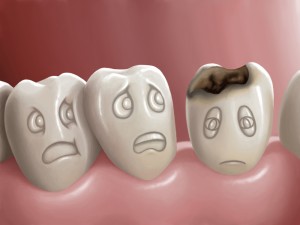
Some people tend to brush off health issues and not take action, as they usually get better by themselves. A person may, for example, ignore a small wound or a cold until it heals or eventually goes away. Unlike some health issues that go away when you ignore them, a cavity or tooth decay does not spontaneously get better and will only get worse, so action is needed the moment your dentist detects one.
What Are Cavities?
Cavities are holes in the teeth which are caused by a combination of bacterial growth and acidic environment. This is formed when microorganisms in your teeth surface become active (usually as they are regularly exposed to and feed on sugars in your mouth). When they do so, they start eating away at the hard tissue of your teeth, causing holes to form. A cavity may start out small, but when left unchecked and untreated, will simply continue to grow and cause more and more problems. Continue reading →

When there is a serious tooth infection, dentists will either extract the teeth recommend an endodontic treatment, which is otherwise known as a root canal. Root canals are done by endodontists, or dental health professionals who specialize in the procedure.
Is Root Canal A Better Option?
A root canal is done by removing the infected or inflamed pulp from inside the tooth. The endodontist then carefully cleans the area inside of the canal, fills it up, and seals the space. Then, the tooth is restored using a filling or a crown.
A root canal is often recommended because it saves the natural tooth. While having one’s tooth extracted may seem like an easier and quicker option, a root canal has advantages over extraction. It keeps your teeth as is, maintain your natural smile. It also promotes normal sensation and biting and promotes proper chewing. Continue reading →
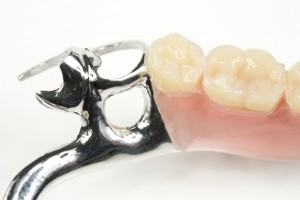
Dentures are delicate items that can easily be damaged. Unlike natural teeth, they are not as strong as they are made from metal or acrylic. When these materials are kept in the mouth for a long period of time, they eventually start to degrade and weaken. Aside from that, they also suffer from daily wear and tear from talking, chewing and cleaning and handling. A combination of these things can cause damage to your dentures.
What should you do when that happens?
Your dentures can be damaged in various ways, but not all of them require emergency treatment. Staining or chipping, for example may require attention, but these may not be emergency situations. However, if they are completely broken, cracked or are missing one or two teeth, then this can be an emergency that you need to have repaired as soon as possible.
Are They Easy To Repair? Continue reading →

Most people clench and grind their teeth from time to time, and doing so occasionally does not cause any harm. Constant grinding, gnashing and clenching (also known as Bruxism), however can cause problems and complications to your oral health.
What Causes Grinding Anyway?
Teeth grinding has always been attributed to crooked teeth or abnormal bite, but it also occurs as a result of anxiety and stress. While many people clench their teeth during the day, the bulk of teeth grinding usually happen at night during sleep, so it may be difficult to tell if you are among the many that do so.
While you may not catch yourself doing it in your sleep, you may notice some symptoms right when you wake up, which serve as telltale signs for Bruxism. Continue reading →

Bleeding gums happen to about three quarters of American adults over the age of 35. Bleeding gums should definitely not go unnoticed and should be cared for and treated by a dentist as soon as possible. There are many reasons why your gums may bleed and it could result in something simple to treat or it may be something more serious that only a dentist can fix. Here are some examples of why your gums may be bleeding.
Inadequate oral hygiene
This is a very common reason for gums to bleed. If you are not brushing and flossing enough or as well as you should, tarter and plaque can get stuck in between your teeth and cause major bacteria to grow which then causes your gums to swell and bleed. Even if you feel you brush often but don not take the time to floss daily, this can really cause havoc to your gums. Make it a commitment to brush and floss daily because healthy gums can become diseased within a 24-36 hour period from bacteria. Continue reading →
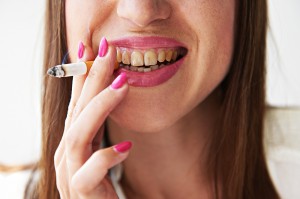
Numerous studies have established the toxic consequences of smoking on your general health. Smoking is the chief cause of lung cancer. According to the American Cancer Society, smoking will cause nearly 87 percent of lung cancer deaths, and tobacco use accounts for almost one in three cancer deaths. Cigarette smoking raises your chances of having a stroke or heart attack. Smoking while pregnant also ties to an increased risk of early delivery, birth defects and infant death. Still, these associations probably are not news to you.
However, did you know that smoking and other tobacco use also have a vastly negative effect on your oral health? Smoking has a distinctively harmful impact on oral health, from superficial issues to disturbingly deep-rooted dental problems. Continue reading →


